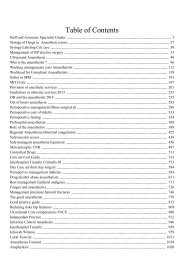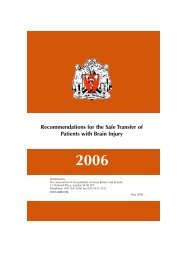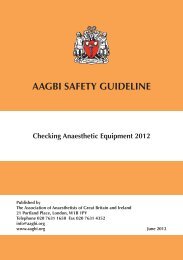TheatrePracticeStandardsGeneric1
Create successful ePaper yourself
Turn your PDF publications into a flip-book with our unique Google optimized e-Paper software.
Generic Theatre Standard No 06E Management of Patients with MRSA in<br />
the Operating Theatre Department<br />
Standard Statement: All Theatre staff will have knowledge of the requirements for caring for<br />
patients with MRSA into operating department to protect self, colleagues and patients from the risk<br />
of health care acquired infection.<br />
General Considerations<br />
RCHT MRSA Policy MRSA - Meticillin Resistant Staphylococcus Aureus Policy<br />
Generic Theatre Standard 04 - Infection control in the Operating Department<br />
• Staff risk the most effective method of preventing and controlling the spread of MRSA<br />
is by the effective decontamination of hands after every patient episode or contact.<br />
Personnel and movement in theatre should be kept to a minimum as MRSA may be<br />
released into the atmosphere on the skin squames, fibres from clothing or carried as<br />
dust particles. There is no reason to exclude pregnant staff from caring for patients with<br />
MRSA.<br />
• Patient position on list schedule DO NOT NEED to be last on list<br />
• Hand Hygiene High standards of hand decontamination are required to minimise the<br />
risk of cross infection. Hands should be adequately decontaminated before and after<br />
patient contact and on leaving an isolation facility/ward. Hand decontamination should<br />
be by thorough washing with soap and water, or the application of a 70% alcohol hand<br />
rub. Bacterial counts increase when the skin is damaged therefore care must be taken<br />
to maintain skin integrity. It is important that a good quality Trust approved hand cream<br />
is applied regularly throughout the shift e.g. beginning and end and when a break is<br />
taken.<br />
• Personal Protective Equipment (PPE) If there is a risk of exposure to blood or body<br />
fluids then all staff handling the patient or having contact with their immediate<br />
environment should wear disposable aprons. If aprons have not been used theatre<br />
attire (tops, trousers and hats) must be changed as soon as is reasonably practicable<br />
or if contamination has occurred. Gloves – gloves do not obviate the need for hand<br />
decontamination and should only be worn when there is contact with body fluids.<br />
• Environment/equipment cleaning All surfaces cleaned with Actichlor Plus following<br />
surgery. Adequate time for cleaning of the theatre and equipment must be allowed<br />
between patients. All surfaces that have been in contact with the patient should be<br />
cleaned as per the manufacturers’ guidelines.<br />
• Recovery PACU instructions Known MRSA patients DO NOT NEED to recovered in<br />
theatre. Appropriate communication with the recovery team must occur to ensure that<br />
they are informed of the patient’s status. PPE (gloves and apron) should be worn<br />
during the transfer. The recovery bay and all equipment must be cleaned following<br />
transfer to the ward. Recovery staff must ensure that the receiving ward is fully aware<br />
of MRSA status and the patient transferred to a side room.<br />
Compliance: 100%<br />
Exceptions: None<br />
References:<br />
• AfPP Principles of Safe Practice in the Perioperative Environment 2011<br />
• RCH Trust Policy MRSA MRSA - Meticillin Resistant Staphylococcus Aureus Policy<br />
• RCHT Decontamination Policy RCHT IPAC Decontamination Policy<br />
37





